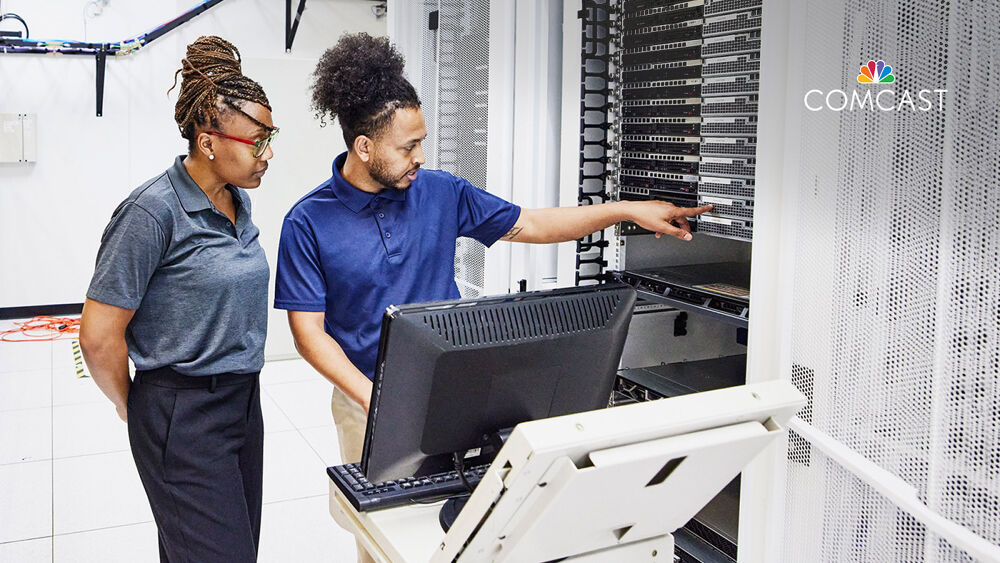NORTHAMPTON, MA / ACCESSWIRE / March 3, 2023 / Comcast Corporation

KEY TAKEAWAYS
- The US workforce has a high demand for digital skills, yet many workers - particularly workers of color and those without higher education - lack these skills.
- Federal funds should increase access to digital skills training, by providing vital support to small businesses, drive economic mobility for individual workers, and benefit the broader economy.
- Prioritizing upskilling, especially within entry-level jobs, can close digital equity gaps and create business growth.
The digital divide is a complex issue that includes barriers to digital adoption and access. However, there is another key element of the issue that is too often ignored: the digital skills gap.
Earlier this week, the National Skills Coalition (NSC) released a report in conjunction with the Federal Reserve Bank of Atlanta on the task at hand and what it means to close the digital skills divide in the workforce.
Here are the key numbers:
92%
92% of jobs available today require digital or likely digital skills - yet nearly one-third of US workers lack opportunities to build these skills.
23%
Jobs that require even one digital skill can earn an average of 23% more than jobs requiring no digital skills - an increase of $8,000 in annual income.
$27K
Businesses can save more than $27,000 per position when they offer upskilling opportunities, versus the cost of replacing a worker who departs.
What does this report tell us?
Across every industry and firm size, the US labor market shows an incredible demand for digital skills and workforce development. This is the reality we face today - not a projection of where jobs will be in the future. When we close the digital skills divide, we can create big payoffs for individuals, businesses, and the overall economy.
What should we do?
The answer lies in partnerships. Both the public and private sectors must work together to equip workers with digital skills. These skills must be both fundamental, like using a computer, and industry specific, like using bookkeeping software.
With an unprecedented federal investment in broadband deployment and adoption, there is no better time for government, private companies, and community organizations to collaborate.
Policymakers can use federal Digital Equity Act and Broadband Equity, Access, and Deployment (BEAD) funds to supercharge free or low-cost digital skills training programs. Such programs include Digital Navigators, in which local experts help folks understand the importance of digital skills and how to access available resources, like the Affordable Connectivity Program (ACP). Across the nation at Comcast, we've launched a network of Digital Navigators who are breaking down barriers to digital literacy and helping more people get and stay online.
As these federal funds are distributed, we have a special opportunity to bring digital skills resources to the communities that need them the most. This includes workers of color as well as small businesses and education providers, many of which rely on publicly funded programs to upskill employees.
The NSC's findings reiterate why I am so proud of the work Comcast has been doing for so long and why we are proud to call NSC a valued partner. Over the last decade, we have grown our Internet Essentials program, the largest and most successful broadband adoption initiative in the industry. Through that program, more than 10 million individuals have become broadband subscribers.
And through Project UP, our $1 billion commitment to help advance digital equity, we're partnering with organizations like CodePath, Hispanic Federation, NPower, and Per Scholas to create equitable access to skills and training so more people secure good jobs and climb the economic ladder.
One of the featured states in the NSC report is Illinois, which Comcast is proud to serve. 90% of the jobs in that state require digital skills. That's why we're working with local organizations like City Colleges of Chicago to ensure students can build critical digital skills.
The pandemic accelerated digital transformation. The importance of not only digital access but also digital skills is clear, and so is the path forward. The NSC's report lays out a roadmap to close the digital skills divide, through increased public investments in digital skill-building.
With this knowledge in hand, let's continue to build and nurture partnerships across the public and private sectors to give everyone the opportunity to succeed in today's digital world.
Broderick Johnson is Executive Vice President, Public Policy & Executive Vice President, Digital Equity.
View additional multimedia and more ESG storytelling from Comcast Corporation on 3blmedia.com.
Contact Info:
Spokesperson: Comcast Corporation
Website: https://www.3blmedia.com/profiles/comcast-corporation
Email: [email protected]
SOURCE: Comcast Corporation




